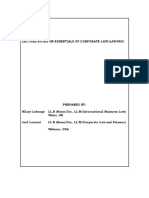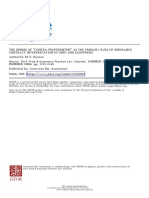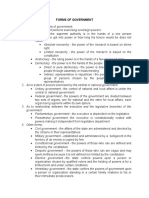What Is A Company
What Is A Company
Uploaded by
Aayushman SharmaCopyright:
Available Formats
What Is A Company
What Is A Company
Uploaded by
Aayushman SharmaOriginal Title
Copyright
Available Formats
Share this document
Did you find this document useful?
Is this content inappropriate?
Copyright:
Available Formats
What Is A Company
What Is A Company
Uploaded by
Aayushman SharmaCopyright:
Available Formats
What is a Company?
Company is an association of person who takes their meals together. The
term is derived from the Latin word (“com” meaning “with” or “together”;
“panis” that is “bread”) Section 2(20) of Companies Act, 2013 states that a
company means any association of person registered under the present or
the previous companies act. It is called a “body corporate” because the
persons composing it are made into one body by incorporating it according to
the law and clothing it with legal personality.
The following are some popular definitions of a “company”
Lord Justice Lindley – “A company is an association of many persons who
contribute money or monies worth to a common stock and employed in some
trade or business and who share the profit and loss arising therefrom. The
common stock so contributed is denoted in money and is the capital of the
company. The persons who contribute to it or to whom it pertains are
members. The proportion of capital to which each member is entitled is his
share. The shares are always transferable although the right to transfer is
often more or less restricted.”
Chief Justice Marshall – “A corporation is an artificial being, invisible,
intangible, existing only in contemplation of the law. Being a mere creation of
law, it possesses only the properties which the Charter of its creation confers
upon it, either expressly or as incidental to its very existence.”
Prof. Haney – “A company is an artificial person created by law, having
separate entity, with a perpetual succession and common seal.”
Important Characteristics of a Company
1. Voluntarily Incorporated Association
The most fundamental characteristic of a company is its incorporation. A
company comes into existence only after it is registered under the Companies
Act. This process of incorporation endows the company with its legal status,
distinguishing it from other forms of business organisations such as
partnerships or sole proprietorships.
A company is typically a voluntary association formed by individuals or a
group of individuals with a shared objective. In most cases, this objective is
profit-making. However, there are exceptions, such as Section 8 of Companies
Act, which are not primarily profit-oriented.
Instead, these companies are formed for promoting charitable, scientific or
educational objectives. This characteristic highlights the flexibility of the
company structure, making it suitable for various purposes.
2. Artificial Person Created by Law
Perhaps one of the most fundamental characteristics of a company is that it is
an artificial person created by law. This means that a company is considered a
legal person in the eyes of the law, capable of engaging in various legal
activities.
As a legal entity, a company can enter into contracts, own property in its name
and sue or be sued by others. This characteristic is pivotal in allowing
companies to operate independently and engage in a wide range of business
activities.
Case Law: Union Bank of India vs. Khader International Constructions and
others (1993)
The significance of a company being treated as an artificial person is
exemplified in legal cases like Union Bank of India vs. Khader International
Constructions. In this case, the Supreme Court of India held that the term
‘person,’ as mentioned in Order 33, Rule 1 of the Civil Procedure Code, 1908,
includes any company.
Therefore, a company has the legal capacity to file a suit as an indigent (poor)
person, emphasising its status as a legal entity.
3. Not a Citizen
While a company is recognised as a legal person, it is important to note that it
is not a citizen. Unlike individuals who have citizenship status, a company does
not possess citizenship rights. Instead, it can only act through natural persons
who represent and manage its affairs.
However, certain fundamental rights provided by the Indian Constitution to
protect individuals, such as the right to equality (Article 14), are also applicable
to companies. This distinction ensures that companies have specific legal
rights while acknowledging their non-citizen status.
4. Separate Legal Entity
One of the defining characteristics of a company is its status as a separate
legal entity. When a company is incorporated under the Companies Act, it is
treated as a distinct person independent of its members or shareholders.
This separation means that the company is responsible for its own actions,
obligations and liabilities. Consequently, the company can enter into contracts,
own property and incur debts in its own name.
Case Law: Salomon vs. Salomon (1895)
The principle of a company’s separate legal entity is exemplified in the
landmark case of Salomon vs. Salomon. In this case, Mr. Salomon had a
personal business in leather and shoe manufacturing. He later created a
company and sold his previous business to this company.
While he held the majority of the company’s shares, the court ruled that the
company was a separate entity from Mr. Salomon. This distinction protected
Mr. Salomon from being personally liable for the company’s debts, reinforcing
the concept of separate legal personality.
5. Limited Liability
A critical feature of companies is the concept of limited liability, which
provides a shield for shareholders against personal liability for the company’s
debts and obligations. This limited liability can take two forms:
a. Company Limited by Guarantee: In this type of company, the liability of
shareholders is limited to a specific amount guaranteed by them in the
memorandum of association. Shareholders are obligated to contribute this
amount only in the event of the company’s winding-up or if the company
incurs losses.
b. Company Limited by Shares: In companies limited by shares,
shareholders’ liability is limited to the extent of the unpaid money on the
shares they hold. In other words, shareholders are responsible for paying the
outstanding amounts on their shares, but their personal assets are protected
beyond this commitment.
6. Perpetual Succession
Companies possess the unique characteristic of perpetual succession.
Perpetual succession means that a company’s existence is not influenced by
the death, insolvency or departure of its members or shareholders.
Unlike other forms of business entities, a company’s life is not tied to the lives
of its owners. It can continue to operate indefinitely unless legally dissolved
through the process of winding up.
7. Transferability of Shares
Under the Companies Act, there are three main types of companies: public
companies, private companies and One Person Companies (OPCs). The
transferability of shares varies among these categories.
Public Company: Public companies allow for the free transfer of shares from
one person to another. Shareholders in a public company can buy and sell
their shares without significant restrictions.
Private Company: In contrast, private companies impose restrictions on the
right to transfer shares. These restrictions are typically outlined in the
company’s articles of association and may involve conditions regarding to
whom shares can be transferred and for what consideration.
One Person Company (OPC): OPCs, as the name suggests, are designed for
single-person ownership. In OPCs, share transferability is not allowed, as there
is only one shareholder.
8. Separate Property
Another crucial aspect of a company’s characteristics is its possession of
separate property. Since a company is considered a distinct legal entity, it can
own, enjoy and dispose of properties in its own name. This separation of
property is significant in protecting the company’s assets and ensuring that
they are distinct from the personal assets of its shareholders.
Case Law: RF Perumal vs. H. John Deavin (1958)
The case of RF Perumal vs. H. John Deavin underscores the principle that no
member can claim ownership of the company’s property during its existence
or liquidation. In this case, it was established that a company cannot have an
insurable interest in its property, reinforcing the concept of separate property
ownership.
9. Capacity to Sue and Be Sued
As a separate legal entity, a company has the capacity to sue and be sued in
its own name. This legal capacity extends to various scenarios, including the
company’s right to initiate legal actions against others and its susceptibility to
legal actions brought by third parties. Additionally, a company can sue its own
members when necessary.
Case Law: Abdul Haq vs. Das Mal (1910)
The case of Abdul Haq vs. Das Mal is an illustrative example of a company’s
capacity to sue. In this case, an employee sued the directors of the company
for unpaid salary. The court ruled that the remedy for such a claim lies against
the company itself and not against its directors or members. This emphasises
the distinct legal personality of a company.
10. Contractual Rights
Companies possess the capacity to enter into contracts in their own name.
This contractual right enables companies to engage in various business
transactions, including agreements with suppliers, customers, employees and
other entities.
When a company enters into a contract, it does so as a separate legal entity
and the contract is binding on the company itself.
11. Limitation of Action
A significant characteristic of companies is the limitation of their actions by the
contents of their Memorandum of Association. The Memorandum of
Association defines the company’s powers and objectives, serving as a guiding
document for its activities.
Any actions taken by a company beyond the scope of its Memorandum of
Association are considered ultra vires and, therefore, void. This limitation
ensures that a company operates within the legal framework defined by its
objectives.
12. Separate Management
In contrast to some other forms of business structures, such as partnerships or
sole proprietorships, members of a company can derive profits from their
ownership without being actively involved in the day-to-day management of
the company.
This separation of ownership and management allows for flexibility in how a
company is structured and operated. Shareholders can focus on their
investments without having to take on managerial responsibilities.
13. Termination of Existence
A key aspect of a company’s characteristics is its mode of termination. A
company is created by law, conducts its affairs within the bounds of the law
and can only be terminated through the legal process of winding up.
This termination process involves settling the company’s affairs, distributing
assets to creditors and shareholders and ultimately dissolving the company.
The existence of a company can be terminated, but only through the
prescribed legal procedures.
Conclusion
Any association of person to be called a company is to be registered under
the procedure prescribed by the Law. An incorporated organisation is queued
with a bundle of advantages, which a partnership firm or any other business
organisation does not have.
Therefore, understanding the characteristics of a company is essential for navigating
the corporate world. The separate legal entity status, limited liability, perpetual
succession and transferability of shares are the pillars that support the company
structure. These features provide the company with the flexibility to grow and adapt,
while also ensuring a framework of accountability and regulation. As the business
environment evolves, so does corporate law, reflecting the dynamic nature of companies
and their role in the economy.
You might also like
- Indian Contract Act (1872) : "An Agreement, Enforceable by Law"Document14 pagesIndian Contract Act (1872) : "An Agreement, Enforceable by Law"ShassidarenDevaSanaPathy100% (1)
- Company Law NotesDocument31 pagesCompany Law NotesSurya Pratap Singh100% (1)
- Case Briefs 2Document4 pagesCase Briefs 2Rachit TiwariNo ratings yet
- Artifiacial CompanyDocument4 pagesArtifiacial CompanyRudrika DubeyNo ratings yet
- Unit 1Document23 pagesUnit 1Nikhilesh RanaNo ratings yet
- BMGT 323 Company Law/Business Law IiDocument19 pagesBMGT 323 Company Law/Business Law Iilil kidNo ratings yet
- Chapter 3 - Company Act: Industrial Law & Accounting (Hum-2231)Document7 pagesChapter 3 - Company Act: Industrial Law & Accounting (Hum-2231)Asif HossenNo ratings yet
- Busy Association BeckyDocument11 pagesBusy Association BeckySamuel L ENo ratings yet
- CL NotesDocument12 pagesCL NotesImperial XNo ratings yet
- What Is A CompanyDocument8 pagesWhat Is A CompanyManvi TomarNo ratings yet
- Company Law NotesDocument71 pagesCompany Law Notesdarlingjutt765No ratings yet
- Assignment: Corporate Law-I Name: Adnan Yousuf Ba. LL.B 6 Semester (Regular) Roll No. 02Document13 pagesAssignment: Corporate Law-I Name: Adnan Yousuf Ba. LL.B 6 Semester (Regular) Roll No. 02saqib nisarNo ratings yet
- 1003 Company Law 2013Document10 pages1003 Company Law 2013admin.manjriNo ratings yet
- company law legalbitesDocument89 pagescompany law legalbitessarsunapsNo ratings yet
- Mba 4Document11 pagesMba 4sangita.aggarwal.194No ratings yet
- Company Under The Companies Act 2013Document14 pagesCompany Under The Companies Act 2013Shubham saxenaNo ratings yet
- Company Law Unit - 1Document22 pagesCompany Law Unit - 1Anjali ShuklaNo ratings yet
- Company Law - RCL ExamsDocument6 pagesCompany Law - RCL ExamsDisha GuptaNo ratings yet
- Companies Act 2013 FullDocument46 pagesCompanies Act 2013 FullTisha JainNo ratings yet
- Introduction To Research Regarding Corporate VeilDocument12 pagesIntroduction To Research Regarding Corporate VeilFaisal AshfaqNo ratings yet
- 1003 Company Law 2013Document10 pages1003 Company Law 2013admin.manjriNo ratings yet
- Black BookDocument89 pagesBlack BookdhwaniNo ratings yet
- Introduction To CompanyDocument15 pagesIntroduction To CompanyShalu ThakurNo ratings yet
- Characteristics of Company. Sahil Kumar updatedDocument5 pagesCharacteristics of Company. Sahil Kumar updatedNishant Singh RawatNo ratings yet
- 6665corporate Laws Manual Final 2021Document354 pages6665corporate Laws Manual Final 2021lekhonNo ratings yet
- Introduction To CompanyDocument14 pagesIntroduction To CompanySunny KhannaNo ratings yet
- Concept of Legal Personality in ZimbabweDocument15 pagesConcept of Legal Personality in ZimbabweBarbra KahondeNo ratings yet
- Company Law NotesDocument90 pagesCompany Law Notes112:Sweta BehuraNo ratings yet
- Introduction To Company PDFDocument8 pagesIntroduction To Company PDFhasan alNo ratings yet
- The Companies Act, 2013: Learning OutcomesDocument40 pagesThe Companies Act, 2013: Learning OutcomesYogesh sharmaNo ratings yet
- Company LawDocument102 pagesCompany Lawabhi24x7mailNo ratings yet
- Nature of A Company: 1. Separate Legal EntityDocument4 pagesNature of A Company: 1. Separate Legal EntityRitikaSahniNo ratings yet
- Company LawDocument9 pagesCompany LawLearn MitraNo ratings yet
- CL PB SLD2Document19 pagesCL PB SLD2Pooja ChatleyNo ratings yet
- corporate law introductionDocument30 pagescorporate law introductionhersheyhari124No ratings yet
- Meaning of Company:: Definition of Company: The Main Definition of A Company Are Given BelowDocument61 pagesMeaning of Company:: Definition of Company: The Main Definition of A Company Are Given BelowaanyaNo ratings yet
- Company Law - Revision - by Parth GuptaDocument46 pagesCompany Law - Revision - by Parth GuptaShruti bajajNo ratings yet
- Company Law Introduction To Company Law: Meaning, Nature and CharacteristicsDocument10 pagesCompany Law Introduction To Company Law: Meaning, Nature and CharacteristicsPawan Saxena0% (1)
- Rule in Solomon CaseDocument18 pagesRule in Solomon CaseNurizati Jamil100% (1)
- Company Unit 1Document34 pagesCompany Unit 1saiyamgrover49No ratings yet
- 2022 Chapter 2 Companies Legal Personality Mercantile LawDocument30 pages2022 Chapter 2 Companies Legal Personality Mercantile LawKgotso JacobNo ratings yet
- Unit-1 CLDocument6 pagesUnit-1 CLKanishkaNo ratings yet
- CompanyDocument9 pagesCompanymani bangarNo ratings yet
- The Companies Act, 2013: Learning OutcomesDocument40 pagesThe Companies Act, 2013: Learning Outcomesmap solutionsNo ratings yet
- Legal Entity of A CompanyDocument5 pagesLegal Entity of A CompanyALiice Mei SanNo ratings yet
- Unit - 1 Corporate LawDocument44 pagesUnit - 1 Corporate LawSanthosh SanthuNo ratings yet
- U1 1 IntroductionDocument23 pagesU1 1 IntroductionAyush LohiyaNo ratings yet
- Compnies ActDocument7 pagesCompnies Acthimanshu bhattNo ratings yet
- TOPIC 1 - Introduction To Company LawDocument16 pagesTOPIC 1 - Introduction To Company LawmunaxemusisoNo ratings yet
- Corporate Law Manual-Mzumbe U'versityDocument102 pagesCorporate Law Manual-Mzumbe U'versityMerckzedeck DidaceNo ratings yet
- Companies LawDocument13 pagesCompanies LawNirvana OshoNo ratings yet
- Business LawDocument19 pagesBusiness LawShailesh AsampallyNo ratings yet
- Unit 01 Introduction To Company: New Alliance First Grade College, CrpatnaDocument86 pagesUnit 01 Introduction To Company: New Alliance First Grade College, CrpatnaningegowdaNo ratings yet
- CLTCDocument7 pagesCLTCBasudev SahooNo ratings yet
- Unit 5 Companies Act: Self Assessment Questions IDocument37 pagesUnit 5 Companies Act: Self Assessment Questions IgaardiNo ratings yet
- Is Company A CitizenDocument11 pagesIs Company A CitizenRitika Ritz0% (1)
- Features of CompanyDocument7 pagesFeatures of CompanySupriya Prakash LimanNo ratings yet
- Corporate Law ModuleDocument140 pagesCorporate Law ModulePhebieon MukwenhaNo ratings yet
- Chapter 1Document56 pagesChapter 1sameer_kiniNo ratings yet
- Companies Act 2013: Meaning of A CompanyDocument7 pagesCompanies Act 2013: Meaning of A CompanyMohit RanaNo ratings yet
- Corporate Leagal Framework 3Document553 pagesCorporate Leagal Framework 3Gurpreet SainiNo ratings yet
- Piercing the Corporate Veil: A Comprehensive Guide for AttorneysFrom EverandPiercing the Corporate Veil: A Comprehensive Guide for AttorneysNo ratings yet
- People vs. CA and Tangan (352 SCRA 599) Incomplete Justifying Exempting Circumstances - FTDocument12 pagesPeople vs. CA and Tangan (352 SCRA 599) Incomplete Justifying Exempting Circumstances - FTChino Estoque FragataNo ratings yet
- Effects of Guaranty - Mira Hermanos Vs Manila TobacconistsDocument3 pagesEffects of Guaranty - Mira Hermanos Vs Manila TobacconistsPamela ParceNo ratings yet
- Julio VS DalandanDocument2 pagesJulio VS DalandanChantal Natan100% (1)
- CITY OF MANILA VS. CHINESE COMMUNITY (40 Phil 349 No. 14355 31 Oct 1919)Document4 pagesCITY OF MANILA VS. CHINESE COMMUNITY (40 Phil 349 No. 14355 31 Oct 1919)BananaNo ratings yet
- Macasaet v. Macasaet (G.R. Nos. 154391-92) PDFDocument25 pagesMacasaet v. Macasaet (G.R. Nos. 154391-92) PDFAgent BlueNo ratings yet
- Plaintiff-Appellee Vs Vs Accused-Appellant The Solicitor General Atty. Henry Y. MudanzaDocument9 pagesPlaintiff-Appellee Vs Vs Accused-Appellant The Solicitor General Atty. Henry Y. MudanzaLeona SanchezNo ratings yet
- 23 - Francia v. Intermediate Appellate CourtDocument13 pages23 - Francia v. Intermediate Appellate CourtGfor FirefoxonlyNo ratings yet
- Legal English MaterialDocument30 pagesLegal English MaterialOrquidea VasquezNo ratings yet
- Chapter 4 - Law On PartnershipDocument23 pagesChapter 4 - Law On Partnershipjoseph planasNo ratings yet
- Livingston v. Virginia Dep't of Transportation, No. 101006 (June 7, 2012)Document36 pagesLivingston v. Virginia Dep't of Transportation, No. 101006 (June 7, 2012)RHTNo ratings yet
- Peoria County Booking Sheet 12/04/15Document7 pagesPeoria County Booking Sheet 12/04/15Journal Star police documentsNo ratings yet
- Full Law For Business Students, 12th Edition Alix Adams - Ebook PDF PDF All ChaptersDocument36 pagesFull Law For Business Students, 12th Edition Alix Adams - Ebook PDF PDF All Chapterschyannsvetan100% (5)
- Contra - ProferentemDocument21 pagesContra - ProferentemheretostudyNo ratings yet
- Filstream Vs CADocument2 pagesFilstream Vs CAkerovreporting100% (2)
- September 22 LaborDocument51 pagesSeptember 22 LaborJuralexNo ratings yet
- CONSUELO LEGARDA, With Her Husband MAURO PRIETO, Plaintiffs-Appellants, vs. N.M. SALEEBY, Defendant-Appellee. FactsDocument2 pagesCONSUELO LEGARDA, With Her Husband MAURO PRIETO, Plaintiffs-Appellants, vs. N.M. SALEEBY, Defendant-Appellee. FactsMikkaEllaAnclaNo ratings yet
- 1.2.2 - For-Profit Types of BusinessesDocument35 pages1.2.2 - For-Profit Types of BusinessesKenny HsuNo ratings yet
- Ma-AO VS CADocument2 pagesMa-AO VS CAlawboyNo ratings yet
- Forms of GovernmentDocument2 pagesForms of GovernmentFelix Tagud AraraoNo ratings yet
- G.R. No. 161151Document9 pagesG.R. No. 161151Vladimir ReidNo ratings yet
- Company Non-Governmental Organizations Shareholders Stock Shares Stock MarketDocument11 pagesCompany Non-Governmental Organizations Shareholders Stock Shares Stock MarketPerry YapNo ratings yet
- Pac CarbonDocument172 pagesPac CarbonBob MackinNo ratings yet
- CIR V Raul GonzalesDocument20 pagesCIR V Raul GonzalesEstelle Rojas TanNo ratings yet
- Roldan V PH Veterans Board: Juridical Person: A Being of Legal Existence Susceptible ofDocument2 pagesRoldan V PH Veterans Board: Juridical Person: A Being of Legal Existence Susceptible ofsweetlunacy00No ratings yet
- Board of Directors Case DigestDocument16 pagesBoard of Directors Case DigestMa Gabriellen Quijada-TabuñagNo ratings yet
- CHAPTER 9 Void and Inexistent Contracts 1409-1422 815855Document8 pagesCHAPTER 9 Void and Inexistent Contracts 1409-1422 815855LawStudent101412100% (2)
- 123407-1999-Dela Cruz v. Court of AppealsDocument9 pages123407-1999-Dela Cruz v. Court of AppealsJenNo ratings yet
- Political Law - Sufficient Standard Test and Completeness TestDocument27 pagesPolitical Law - Sufficient Standard Test and Completeness TestJames R. Velasco Jr.No ratings yet

























































































